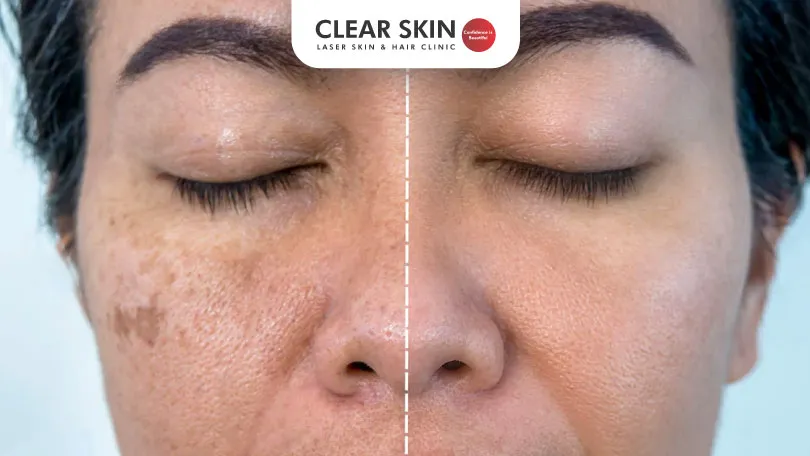Reviewed By:

So, can vitamin D deficiency cause melasma? Can an iron deficiency cause melasma? Which deficiency causes melasma on the face? Lets Explore Now!
Melasma is a skin condition in which grey or brown patches appear on the skin. It is a type of hyperpigmentation in which excess melanin is generated by the skin and it mostly affects the skin areas that are exposed to the sun. The main causes of melasma include hormonal fluctuations and sun exposure. Harsh chemicals in skin care products could also cause hyperpigmentation. Melasma is also linked with one’s genetic makeup. Hormonal imbalance during pregnancy can lead to melasma, which is when it is also known as the mask of pregnancy.
This skin condition goes away on its own while melasma caused by other factors requires treatment. Overexposure to the sun causes the skin to generate more melanin, leading to the appearance of dark spots or patches on the skin or darkening of the sun-exposed skin areas, mostly on the face.
Table Of Content
- What Deficiency Causes Melasma?
- What are Melasma Causes and Treatments?
- Conclusion
What Deficiency Causes Melasma?
Studies have proved that there is a link between vitamin B12 deficiency and melasma, which means a deficiency of vitamin B12 can cause melasma on the face. Iron deficiency anemia can also lead to melasma. Some believe that the deficiency of vitamin D could cause melasma but there are no reports of vitamin D deficiency being associated with this skin condition. So, can vitamin D deficiency cause melasma? No. Can an iron deficiency cause melasma? Yes. Which deficiency causes melasma on the face? It is a vitamin B12 deficiency.
What are Melasma Causes and Treatments?
One important cause of melasma is hormonal imbalance and the other primary reason behind this form of hyperpigmentation is radiation from the sun. Melasma may also be caused by nutritional deficiencies like those of iron or vitamin B12. Melasma causes dark patches on the skin, and the condition worsens due to sun exposure. So limiting sun exposure, and wearing sunscreen and protective gear when going outdoors are good preventive measures for melasma as well as an important part of treating this skin condition.
If hormones are the cause of melasma, restoring hormonal balance is the best treatment for the same. If a dietary deficiency is the cause of melasma, increasing the intake of the deficient nutrient helps reduce skin pigmentation. Vitamins like B12, A, E, and C and minerals like iron, selenium, and zinc are good for maintaining the overall health of the skin. Having a nutritious diet is crucial to keeping the skin healthy and glowing.
Best Treatment For Melasma (मेलस्मा/वांग का इलाज करने के लिए सबसे अच्छा उपचार) | Clear Skin, Pune
Melasma treatments include topical creams with ingredients like kojic acid and hydroquinone. These creams help in lightening the skin and thus reduce the dark patches caused by melasma. Chemical peels are among the best treatments for melasma. Light and laser therapies are also effective in treating melasma on the face. A dermatologist is the best person to approach for advice on melasma or any other skin condition.
One of the best places to take skin consultations is ClearSkin, a recognized skin clinic in Pune. They have a team of experienced dermatologists who will guide you in the best way, give you the most effective treatments, and help you in attaining beautiful, blemish-free skin.
Do You Know?
Roughly 250 Patients Are Treated
Everyday By These Dermatologists
Book An Appointment
(You are one click away from flawless skin)
Meet Our Dermatologist!
Dr. Manali Shah
Conclusion
Melasma, a common skin condition causing brown or gray patches, can be influenced by deficiencies in vitamin B12 and iron. Addressing these deficiencies through diet or supplements, along with protective measures against sun exposure, can help manage melasma. Treatments like topical creams, chemical peels, and laser therapies are effective in reducing hyperpigmentation. Consulting with a dermatologist is essential for personalized care and optimal results.










































